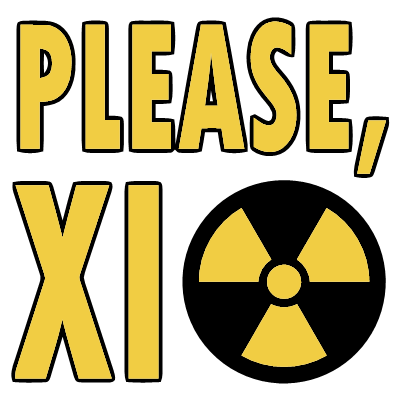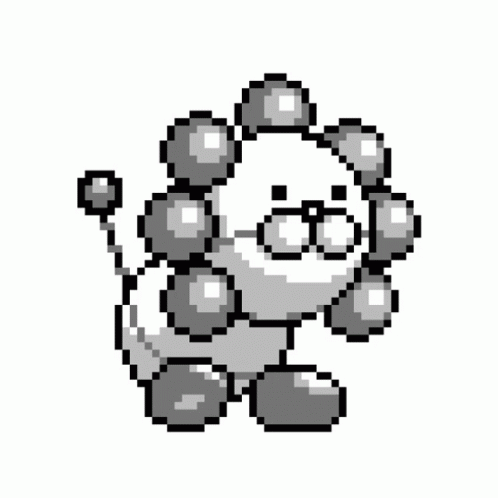I
 you so much
you so muchRambling about my ability to comprehend the text
习近平
I should’ve been able to recognize 近 as the same character in 最近 saikin (“lately”), but sometimes you only really learn to recognize a character in a few specific words rather than on its own, so mentally I just sort of skipped over it at first.
I did recognize 平 right away, though. The kun’yomi of this character is ひら hira as in the surname 平沢 Hirasawa and its on’yomi is へい hei as in 平成 Heisei, and the general meaning of the character is “broad and flat thing” or “even, level; calm, peaceful”. Because the text is Chinese and the Japanese ha-gyou derives from earlier /p/, and many diphthongs or long vowels in Japanese on’yomi derive from final /ŋ/ in Middle Chinese, I managed to pretty quickly retrieve from the on’yomi the memory that the Standard Chinese reading of the character is ping (though I did not commit the tone to memory)
It was around this moment that I realized that these three characters looked like a Chinese name being used vocatively, and the only Chinese name ending in ping that a Hexbear user would use vocatively in a joke would be Xi Jinping. And this was when I remembered that Jinping is Kinpei in Japanese, and that triggered a memory of 近, and a memory of looking up the surname Xi and seeing that it was written as 习 in Simplified Chinese.
And so I concluded that 习近平 was Xi Jinping.
An interesting thing to note is that the shift of /k kʰ/ to /tɕ tɕʰ/ in Mandarin before the medials /i y/, hence Standard Chinese 近 jin4 versus Standard Japanese 近 kin both from Middle Chinese gj+nX, resembles an independent sound change that happened in the Tôhoku dialect group of Japanese, so while the readings are clearly distinct between Standard Chinese and Standard Japanese, they’re apparently more similar between Standard Chinese and Tôhoku dialect.
Of course, this sort of palatalization is a common sound change across language families!
我的人民渴望自由
I could immediately recognize 我的 as “my”, 人民 as “people”, and 自由 as “freedom”, and I could infer from context that 渴望 probably meant “yearn for”, even though I knew neither of the characters (望 is apparently the character in 絶望 zetsubou, “despair”, literally something like “ceased hope”; 渴 apparently means “thirst” but is not commonly used in Japanese). In Japanese 人民 is read as jinmin and 自由 is read as jiyuu.
我 has the kun’yomi わ wa as in 我が国 wagakuni (“my/our country”), or われ ware as in 我々 wareware or 我ら warera both meaning “we, us” — these kun’yomi are obviously unrelated to the Standard Chinese pronunciation wo3, but the coincidental similarity does make the Chinese pronunciation easier to remember. In Japanese 我 ware or wa is not often used as a first-person singular outside of a few set expressions, but it’s not exactly difficult to remember if you know those set expressions and the plural forms that 我 is the go-to word for “me” in Chinese, whereas the go-to word for “me” in Japanese (私 watashi) actually means things like “personal” or “private” in Chinese, in Standard Chinese read as si1.
的 is a character I actually first learned in Chinese (despite not studying Chinese), just from noticing it a lot in Chinese texts and looking through lists of Chinese particles. It’s easy to remember that de functions as a Chinese equivalent to -'s since it’s basically like “French in reverse”, and the character was simple and distinct enough to recognize quickly. In Japanese I quickly found that the character was most often read with the on’yomi てき teki, and was commonly used as a suffix to derive na-adjectives. So it was easy for me to remember these as having a Middle Chinese ancestor tek, where the Standard Chinese particle reading is a reduced form[1] whereas the Japanese on’yomi added an epenthetic -i, and it was also easy enough to remember that the character that forms possessives in Chinese forms adjectives in Japanese, since these are similar enough meanings.
的 does have other meanings too, naturally. I learned the word 目的 mokuteki (“goal, purpose, objective”) from the HoneyWorks song 「男の子の目的は何?」 Otokonoko no Mokuteki wa Nani? (“What Is A Boy’s Goal?”) where the first character means “eye” and the second character is not an adjectivizer but rather means “target”. So the “target in your eye” is your goal or objective, it makes sense but raises the question of why a character meaning “target” would also be used as an adjectivizer or possessive particle… I guess we do say “Bullseye!” in response to an apt description of something, though.
请发送东风导弹
There was really only one character I could recognize right away in this part: 风 I was pretty certain was feng (tone not committed to memory) as in 风水 “feng shui”, and the Japanese form of this character is 風 with the on’yomi ふう fuu as in, well, 風水 fuusui, “feng shui”, literally “wind and water”. I’d say 风 is a pretty striking and memorable simplified form for a very common character, and 風 is itself a pretty striking and memorable character.
The next character that jumped out at me was 弹 because it reminded me of the character 戦 meaning “war” or “battle”, but I knew that that wasn’t the right character, since 戦 has a dagger-axe on the right while 弹 has an archer’s bow on the left, so the only thing these characters actually have in common is the 単 — a character I honestly refer to as “the tan in tango” or as “two arms holding a stinky tennis racket” because I never actually learned what 単 meant. It means “single”, apparently, including “singles” in tennis, so I guess I was right to think of a tennis racket.
Not that knowing the meaning of 単 would’ve helped me identify the character 弹, because the 単 seemed like it was providing a hint as to the pronunciation of the character rather than the meaning. But given the archer’s bow, and the fact that my mind was already thinking of war and battle due to being reminded of 戦, I eventually realized that 弹 was the character for “bullet” or “missile” or “offensive projectile in general”. To think of “the tan in tango” was a decent enough idea, since the on’yomi is dan as in 弾幕 danmaku, in Chinese danmu with tones I don’t know, meaning “bullet hell” or “those scrolling comments you see on Niconico and Bilibili”.
So as I was saying, the 単 was hinting at the pronunciation.
When looking up each of the remaining characters individually, I realized that I should’ve been able to identify 送 as the character in 送る okuru “to send, dispatch” as in 「この番組はご覧のスポンサーの提供でお送りします」 kono bangumi wa goran no suponsaa no teikyou de ookurishimasu, a phrase the old-school weebs should be well-acquainted with. This is the same character used in the word 放送 housou (“broadcast”) which is the H in NHK.
For the character 请 I knew to mentally replace the 讠 with 訁 but unfortunately 請 was still an unfamiliar character for me. It apparently means “ask (for), request”. The radical means “speech” or “language”.
发 I’d have no hope of identifying as 発 (depart, emit) and likewise 东 as 東 (east). I do vaguely feel like I learned that 东 was the simplified form of 東, but if I did learn that, the knowledge certainly did not stick. 东风 Dongfeng is apparently the name of a family of Chinese ICBM.
Lastly the character 导 I’d have no hope of identifying as 導, especially given that I don’t know the character 導 to begin with. The character apparently means “guidance”, so 导弹 would be I guess a “guided missile”.
Nevertheless, if I managed to read “Xi Jinping, my people yearn for freedom. ??? wind ?? missile.” — it doesn’t take much to infer that the blanks are probably something along the lines of “please launch”, given the whole “please, Xi” meme.
Actually, it’s apparently an unrelated word that was later respelled with the character 的 ↩︎
I’m shocked my google translate shitpost got such a high effort response
Its genuinely a good look at what goes on in a language learner’s mind, it’s almost identical to what happens when I try to make sense of Kanji but read it in the Hanzi meaning but in reverse.
我慢する oh okay wo3man4 suru must mean I am slow

I mean, hey, it’s in the ballpark
Oh and the characters in 人民 mean “person-people” and the characters in 自由 mean “self-reason” I guess pointing to the freedom to act according to one’s own conscience.
民 to me always evoked a parade banner, so it was easy for me to relate that to a general idea of “the people”, “a nation”, “folk” or “citizenry”. Apparently the actual meaning of the character is an eye getting stabbed with a dagger, possibly because of an ancient practice of blinding slaves, so. I kinda prefer my own interpretation.
自 was a character I’d always remembered for its resemblance to 目 eye, just with a little tick at the top to distinguish it: if 日 sun with a tick at the top became 白 white, the sun’s color, then 目 eye with a tick at the top could become 自 self, as in “in someone’s eyes”.
However it turns out that 自 is actually a pictogram of a nose because that’s where East Asians point to when they go “Who, me?” — and for that matter 白 white is not actually derived from 日 sun.
A last thing I thought was kind of interesting, about that character 私 I mentioned: the swirly thing in the right half of the character is supposed to evoke the idea of “revolving around oneself”, that was the original form of the character. Later a stalk of grain was added to the left-hand side, to evoke the idea of a privately-owned field. So it was from this original sense of “private” that in Japanese the character came to take on the meaning of “me”, whereas this character never acquired this meaning in Chinese.
 in China, the evil CCP banned the word “love”
in China, the evil CCP banned the word “love”In Persian we sometimes say جانم فدایت
This translates to “I’d sacrifice my soul for you”
同志习近平,我爱你
Tongzhi, xiansheng, etc. go after names in Chinese not before.
谢谢,我在学习。
Yeah but at what cost?
c’mon, what’s a little fraternal kiss between socialist brethren
That is really beautiful

I love you in Chinese is 我爱你. 发射导弹 is I do.
no it’s “习近平,我的人民渴望自由。请发送东风导弹”, look it up
修正主义者
sounds like a lot of words to say to my spouse before they leave for work.












